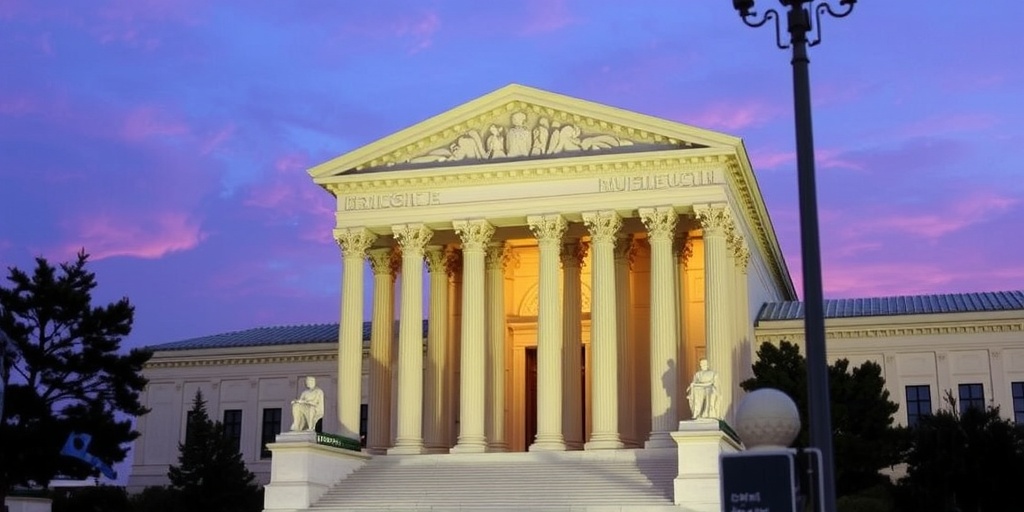Now Reading: Supreme Court Allows States to Sue Oil Giants
-
01
Supreme Court Allows States to Sue Oil Giants
Supreme Court Allows States to Sue Oil Giants

The Supreme Court of the United States made a significant ruling on Monday, opting not to hear a case that sought to limit the ability of states to sue oil companies for financial damages caused by climate change. This decision has major implications for ongoing lawsuits against major fossil fuel companies that have been accused of misleading the public about the impact of their greenhouse gas emissions.
The case was initiated by a coalition of 19 Republican attorneys general from states such as Alabama and West Virginia. They aimed to prevent Democratic-led states—from California, Connecticut, Minnesota, New Jersey, and Rhode Island—from pursuing legal action against the oil industry. These Democratic states have brought lawsuits against prominent fossil fuel corporations, alleging that these companies engaged in deceptive practices regarding the detrimental effects of their emissions.
One prominent example is a lawsuit filed in 2023 by California Attorney General Rob Bonta against five of the world’s leading oil and gas companies, including BP and Exxon Mobil, as well as the American Petroleum Institute, a lobbying organization representing fossil fuel interests. Minnesota Attorney General Keith Ellison, who initiated a similar deception lawsuit back in 2020, expressed his satisfaction with the Supreme Court’s decision. He interpreted the efforts of the Republican attorneys general as a political maneuver designed to protect the oil companies from accountability.
With the Supreme Court’s refusal to intervene, these climate-related lawsuits can now move forward without the hindrance of a legal battle focused on their legitimacy. There are numerous pending lawsuits across the nation aimed at holding fossil fuel companies financially responsible for climate damage. According to Michael Gerrard, the director of the Sabin Center for Climate Change Law at Columbia University, the ongoing litigation reflects a broader strategy to compel these companies to reckon with the consequences of their emissions.
Back in January, the Supreme Court had hinted at a potential unwillingness to support the Republican attorneys general’s attempts to block these lawsuits. The justices previously declined to review a Hawaii Supreme Court decision that allowed the state’s climate deception case to proceed to trial, signaling a possible reluctance to interfere with state-level legal actions against fossil fuel companies.
Supporters of the Republican-led effort contended that state lawsuits could be unconstitutional and might disrupt interstate commerce. They argued, for instance, that if one state elected to promote fossil fuel production, the legal liabilities stemming from lawsuits in other states could deter investments and impact oil and gas prices. Donald Kochan, a law professor at George Mason University, emphasized that allowing individual states to dictate commercial activities could lead to inconsistencies and adverse effects on businesses operating across state lines.
Legal experts criticized the Republican-led initiative as unusual since it targeted state claims before they had been resolved in state courts. Gerrard noted that petitioning the Supreme Court at this stage could set a troubling precedent, inviting future requests aimed at halting a variety of legal actions prematurely.
“The Supreme Court is indicating that, at least for now, it will not intervene,” Gerrard remarked following the decision. This ruling allows the lawsuits to progress, providing an opportunity for states to seek reparations from fossil fuel companies for their contributions to climate change.
Interestingly, these lawsuits correspond with a wider legislative push involving new “superfund” laws addressing climate issues. These laws require polluters to take responsibility for the environmental impact of their greenhouse gas emissions within their jurisdictions. The legislation is inspired by the Superfund program established to clean up toxic waste sites.
The first of such climate-focused superfund laws was enacted in Vermont in the summer of 2023, with New York following suit in December of the same year. However, these measures have also faced legal challenges, notably a lawsuit filed by a coalition of 22 states led by West Virginia against New York’s new climate superfund law.
In conclusion, the Supreme Court’s decision to reject the appeal from Republican attorneys general marks a critical moment in the ongoing fight against climate change and the accountability of fossil fuel companies. As lawsuits from Democratic-led states advance, the outcome could set a significant precedent for how climate change litigation unfolds in the future.
Stay Informed With the Latest & Most Important News
Previous Post
Next Post
-
 01New technology breakthrough has everyone talking right now
01New technology breakthrough has everyone talking right now -
 02Unbelievable life hack everyone needs to try today
02Unbelievable life hack everyone needs to try today -
 03Fascinating discovery found buried deep beneath the ocean
03Fascinating discovery found buried deep beneath the ocean -
 04Man invents genius device that solves everyday problems
04Man invents genius device that solves everyday problems -
 05Shocking discovery that changes what we know forever
05Shocking discovery that changes what we know forever -
 06Internet goes wild over celebrity’s unexpected fashion choice
06Internet goes wild over celebrity’s unexpected fashion choice -
 07Rare animal sighting stuns scientists and wildlife lovers
07Rare animal sighting stuns scientists and wildlife lovers




















